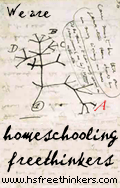Although this foray into unschooling was initially only research for a project and I remained skeptical of its value and authenticity, I began to get interested, if only at first to justify and support my own increasingly easy-going style of home education. Holt started working his magic on me.
Then I noticed an interesting thing. Elle had been doing a math drill, one hundred basic addition facts. After completing about three-fourths of them, as she was about to write the sum of 3 + 2, she suddenly stopped, looked at me and said, “Oh! I’ve been writing my 5’s backward.” I looked back over her paper, and sure enough, there, about 40 problems earlier, was the one, single previous number five on the sheet, the second digit in the sum 15, written reversed. I was immediately reminded of Holt’s example and explanation of why a young girl could read one word correctly on one page but then could not read it when she encountered it again a few pages later, and saw that this was indeed how real learning takes place.
In practice, this means that you get a faint hunch, lose it, get it again, test it, lose it again, get it again – and all this many times over. You think that a word says such and such; it seems to work; you meet the word again, and try a new hunch; it doesn’t work, causes an inconsistency; you correct the mistake, and go on. After many times, you know the word. You have not memorized it; you know it. It is part of your model of the way things are; you could no more ‘forget’ it than you could forget that if you drop your shoe, it will fall to the floor, not rise to the ceiling.
Quoting Professor David Hawkins, who stressed the importance of a liberal amount of time spent ‘Messing About’ as a key element of an education, Holt went on to say:
’All of us must cross the line between ignorance and insight many times before we truly understand.’ Not only must we cross that line many times…nobody else can cross it for us, we must cross it by ourselves. Being shoved or dragged across does no good.
Holt felt he’d seen enough ‘messing about’ with math to convince him “that if arithmetic were treated as in fact what it is – a territory to be explored, not a list of facts to be learned – children, at least many children, would move into it faster than we would have dreamed possible."
And listening to Elle work her facts drill, I agree. The child looks for patterns, even where there are none intended. I discontinued using her regular workbook because Elle would not answer the problems as required, but would answer them according to some pattern only she could discern: These two answers were 2s, then there was a 3, then two more 2s, so this next answer must be 3; or notice that equivalent digits when connected on the page by straight lines make some sort of design. She thinks she has cracked some code the math book writers surreptitiously figured into their worksheets. When working on the current drill sheets, the same set of basic addition facts each day, she will make marks next to particular problems as she answers them, identifying them as ‘doubles’ or ‘turn-arounds’ in her own shorthand. It’s fascinating to watch her play with her numbers.
One of the fundamental ideas behind what we do in school is that children should and must spend many years memorizing a lot of dull facts before they can begin to do interesting things with them. This is a foolish way to go about things and it doesn’t work. Most children get so fed up with learning the dull facts that they quit before they get enough of them to do, or even to want to do, anything interesting with them. And even of the children who do learn all the facts, most have their wits so dulled in the process that they cannot think of anything to do with them, but just go on accumulating more and more – which accounts for too much of the activity in our graduate schools and universities.
In this, as in so many other things, we do things backwards. We think in terms of getting a skill first, and then finding useful and interesting things to do with it. The sensible way, the best way, is to start with something worth doing, and then, moved by a strong desire to do it, get whatever skills are needed. If we begin by helping children feel that writing and reading are ways of talking to and reaching other people, we will not have to bribe and bully them into acquiring the skills; they will want them for what they can do with them.
Holt described a boy initially interested in scuba diving. He followed this interest to an interest in treasure divers, underwater archaeology, archaeology, Schliemann’s search for Troy, Homer, and on to The Iliad.
This was my second eye-opener. Elle and I had just read about the Roman catacombs. When we went online to take a look at photos of the catacombs, I commented how these weren’t the spooky ones with the skulls. She wanted to see those, so we looked up the Parisian catacombs. One photo showed a large stone marker with Latin inscriptions. She demanded to know what it meant and we began to work out a translation. It was true, it really could happen as easily as that.
[Children learn by seeing] the world as a whole, mysterious perhaps, but a whole none the less. They do not divide it up into airtight little categories, as we adults tend to do. It is natural for them to jump from one thing to another, and to make the kinds of connections that are rarely made in formal classes and textbooks. They make their own paths into the unknown, paths that we would never think of making for them. …Even if we did, there are children for whom this would not be a good beginning, or a beginning at all. Finally, when they are following their own noses, learning what they are curious about, children go faster, cover more territory than we would ever think of trying to mark out for them, or make them cover.
But won’t kids end up being narrowly focused specialists, intently studying and becoming expert on only those few subjects that greatly interest them?
Many adults do this; the universities are full of people who have shut themselves up in little fortresses of artificially restricted private learning. But healthy children, still curious and unafraid, do not learn this way. Their learning does not box them in; it leads them out in many directions. Each new thing they learn makes them aware of other things to be learned. Their curiosity grows by what it feeds on. Our task is to keep it well supplied with food.
Learning to hold my tongue and not lead Elle to the answers will be my greatest challenge. Holt has taught me that ”[Children] need to build up a mental model of the territory before they start trying to talk about it. We teachers like to think that we can transplant our own mental models into the minds of children by means of explanations. It can’t be done.”
The following notable quotes referred to paid teaching professionals, but they certainly apply to any home educators:
…In any school whose main business is preparing children to get high scores on achievement tests, regents’ exams, merit scholarship exams, college boards, and the like, we are not likely to see any open-ended, independent student work. They tend to be so sure that the path they have marked out for their students is the best of all possible paths, that their main concern is how to lead or drag them down it as fast as possible.
…Anyone who makes it his life work to help other people may come to believe that they cannot get along without him, and may not want to hear evidence that they can, all too often, stand on their own feet. Many people seem to have built their lives around the notion that they are in some way indispensable to children, and to question this is to attack the very center of their being.
…she was under the pressure of the curriculum, the academic lockstep, and both she and the children were under the pressure of the nervous parents, worried about their children’s ‘progress’ – that is, whether the Ivy League express was running on schedule.
I am now onboard with Holt and trying to ignore the whistle of the Ivy League express. It seems I have almost come full circle, from unstructured in my kids’ earliest years to highly structured and now easing back toward unstructured again, thanks, in part, to my reversed readings of Holt. And it is legitimate; I am not just sloughing off all responsibilities. Completely letting go is not likely for this somewhat uptight control freak – I still believe there are cultural standards that must be met – but I am now a firm believer in the advantages of unschooling and greatly admire those who do.
Next up, back to the beginning with How Children Fail.











3 comments:
Your discovery that children's innate curiosity can lead them to learn in unexpected ways is something I wish would be taken into account in schools. We're homeschoolers, but I'm just sad for all those kids in schools - so much of their time is spent learning what other people want (and when, and how, and for how long, and why, etc.). There's not the same sort of meaningful context to knowledge gained in that way.
We're on the unschooling spectrum, but paradoxically will be adopting a school-at-home approach--at the request of our son. I'm definitely an unschooler at heart, and will leave plenty of time for breaking from the plan when the mood demands it.
Be well-
Tara
Holt has captivated me recently as well! I read Learning All the Time when my daughter was a baby, and although many of his points rang true, it didn't quite click with me at the time. Then a few months ago, I read all three of David H. Albert's books (his writing is scattered and not as clear as Holt's), in which Holt was mentioned frequently. So I read Instead of Education and was hooked. I haven't been able to get enough in the month since, rereading Learning All the Time and reading for the first time How Children Fail, How Children Learn, Instead of Education, and Never Too Late: My Musical Life Story (which particularly spoke to me, having an urge to take up violin in my 30s).
I found your post fascinating. :)
Welcome Tara and Chanale, and thanks for your comments.
Just this morning I talked to another mom who's thinking about homeschooling and not particularly interested in using the state government's distance education package. She's now on the list to borrow the Holt books too.
Hurray for independent thinkers!
Post a Comment